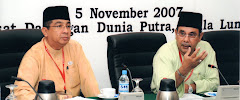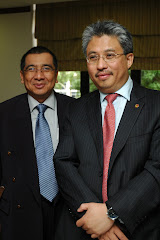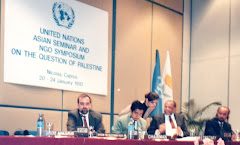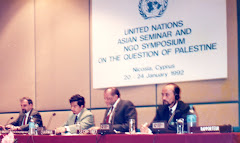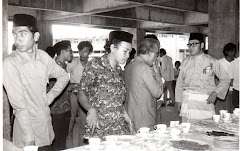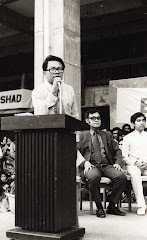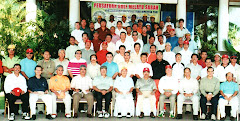Pakatan’s ‘seven-year itch’
The Penang Government will also become shaky if DAP carries out its threat to pull out of the Selangor administration.
SELANGOR Mentri Besar Azmin Ali was in Kelantan the day DAP declared that Pakatan Rakyat had ceased to exist.
It was quite ironic because there he was, looking so cosy and chummy with his Kelantan counterpart Datuk Ahmad Yakob while there was hue and cry elsewhere over the news.
The PKR deputy president is not the sort to wear his feelings on his sleeve and he seemed unruffled even as the rest of his party was behaving as though ants had invaded their pants.
Azmin was there for the signing ceremony to build homes for those displaced by the great floods last year and he had brought along several state exco members and civil servants. Selangor will build 60 houses at a cost of RM6mil in Kuala Krai, the Ground Zero of the Kelantan floods.
Was it his way of telling everyone that ties between PKR and PAS are on track even if DAP is pulling away?
The PKR deputy president has struggled to remain calm in the days following what some have termed as the “death of Pakatan”.
The jury is still out on whether Pakatan is really dead or still alive.
The joke is that Pakatan is going through the seven-year itch. It has been seven years since the three parties came together under the Pakatan umbrella and it seems like the threesome have begun to get antsy about their significant other.
PAS election director Datuk Mustafa Ali’s tongue-in-cheek take is that the coalition haspengsan (state of unconsciousness).
PKR’s admission that the coalition still exists but can no longer function formally suggests that Pakatan is in a wheelchair – it can still roll on but cannot walk or run.
Itchy, pengsan, in a wheelchair or whatever you call it, Pakatan is in a bad place at the moment. The coalition that won 52% of the popular vote in the general election and which regained Penang and Selangor with bigger mandates has squandered its opportunities and made a mockery of the new politics that they promised.
It is broken and that is perhaps the most accurate definition at this point in time.
PKR sources said their ketua umum Datuk Seri Anwar Ibrahim is furious that one party should decide on the status of a three-party coalition. He finds it “bloody arrogant” and has made it known to his party.
Well, he has a point there – this is a three party set-up and it needs at least two to decide.
Emotions are high and the administer for Anwar’s Chinese Facebook “Ah Hua Gor” had posted: “Thank you DAP for burying PR”.

Lee: ‘We are in uncharted waters’.
The DAP cybertroopers came down so hard on him and even put pictures of his children online that he had to apologise and take down the posting.
“The word from our topmost leadership is that there must be continued engagement even if we cannot work as a formal pact,” said PKR vice-president Shamsul Iskandar.”
DAP’s haste to issue Pakatan’s death certificate was aimed at appeasing its Chinese support base which has become very critical of PAS. It needs to distance itself from PAS or risk losing support in the next general election.
There is a very strange situation going on. PAS has severed ties with DAP and DAP is dead against PAS’ Islamic agenda but both do not want to leave. They are waiting for each other to get out.
As a result, DAP has resorted to pressuring PKR to choose between the two parties. But PKR feels that it does not have to choose because it can work with both parties.
Behind the scenes, Selangor DAP is threatening a pullout of sorts from the Selangor government if PKR does not choose.
Selangor DAP chairman Tony Pua has been the most hawkish of the lot. He has been quoted in the Chinese media demanding that Azmin choose between DAP and PAS.
Recently, Chinese media reports quoting sources from Selangor DAP claimed that if Azmin did not choose, DAP state exco members would resign after Hari Raya. The DAP had done the same thing to force Tan Sri Khalid Ibrahim to resign.
The anonymous DAP leader also demanded that Azmin sack the PAS state exco members who want to ban alcohol sales in Selangor.
Softer approach
Azmin did not retaliate. Instead, he used the personal touch to reach out to DAP leaders when he met them in Parliament a few days later. He approached the MPs personally, asked for their understanding and urged them not to make such public statements.

Shamsul: ‘Continued engagement goes on'.
“The three parties in Selangor have to respect the wishes of the voters who gave them such a big mandate. People are fed-up with the politicking, we need to find a way to manage things until the term runs out. Dissolving the state assembly is an option of last resort,” said DAP’s Jelutong MP Jeff Ooi who is also a columnist in Sin Chew Daily.
However, Ooi did not rule out a “final fallout” taking place between DAP and PAS.
The blame game is still going on but the fact is that all three parties contributed to the crisis.
PKR sparked it off with the controversial Kajang Move. PAS regarded it as a disrespectful unilateral decision and refused to support Dr Wan Azizah for the Mentri Besar post.
Then PAS moved to introduce hudud law in Kelantan which erupted in a war of words with DAP. The PAS muktamar decision to severe ties with DAP was the catalyst to DAP jumping the gun to declare that Pakatan is finished.
It was a domino effect phenomenon, and it is unclear whether the last domino has fallen yet.
The perception is that PKR has the most to lose if DAP pulls out from the Selangor government.
But PKR will not take it lying down, it can also pull out from Penang and put Chief Minister Lim Guan Eng’s government in jeopardy.
In Penang, DAP has 19 out of 40 state seats, PKR has 10, PAS 1 and Umno 10. The Penang government can still survive as a single-party government but it will be a government standing on one leg.
It will be a very weak government that is unable to pass laws in the state assembly or make major decisions. It will also become a near mono-ethnic government that will be highly unstable.
And if the Selangor DAP state exco members carry out their threat to quit, PKR could do the same to Lim’s state exco in Penang. In the end, both governments could come tumbling down.

Ooi: Final fallout ahead for DAP and PAS.
“We are in uncharted waters, we need to exercise restraint. A tit-for-tat game is not good for anyone,” said former Kajang assemblyman Lee Chin Cheh.
The political chatter is that DAP’s aggression in Selangor is also connected to DAP wanting a bigger slice of the pie in the state such as appointments to important state GLCs and other government posts. There is also a rumour going around that a Selangor DAP leader wants to become the Mayor of Petaling Jaya.
DAP is trying to change its Chinese image, hence, its attempt to recruit pretty Malay girls and high-profile Malay names. It is trying to recruit credible Malays whom it can put as candidates in the next general election.
New multiracial flavour
The party is also trying to woo the PAS moderates who lost in the recent party PAS election. It will be quite a catch if big names like Mohamed Sabu or Dr Mujahid Yusof Rawa sign up.
It has managed to recruit national laureate Datuk Samad Said while law professor Dr Aziz Bari, who contested but lost in the general election on a PKR ticket, may soon join DAP.
DAP does not want to depend on PAS or PKR for the multiracial flavour if it wins well again.
That is the DAP plan for the next general election and the day when Selangor has its first DAP Mentri Besar may not be far off.
But the “Pakatan is dead” pronouncement has made things terribly awkward for the three parties.
Will DAP state exco members still attend the weekly state exco meetings with their PAS counterparts? Is it going to be business as usual or will it be like a funeral?
The Penang government has begun to use the term Kerajaan Negeri Rakyat Pulau Pinang. Will DAP politicians in Selangor follow suit or will it continue to labour under the old name? It is so easy to say die, but the devil lives on in the details.
DAP leaders have also begun promoting the notion of a new political realignment.
Veteran Lim Kit Siang said the new coalition will comprise political forces of like-minded people with the interests of the people at heart.
Hmmm ... wasn’t that what they said when they set up Pakatan Rakyat?
Everyone had settled in with their popcorn and soft drinks to watch the Mahathir-Najib action movie.
But that was so yesterday – the audience has moved on to a more gripping thriller called the “Death of Pakatan Rakyat”.

































